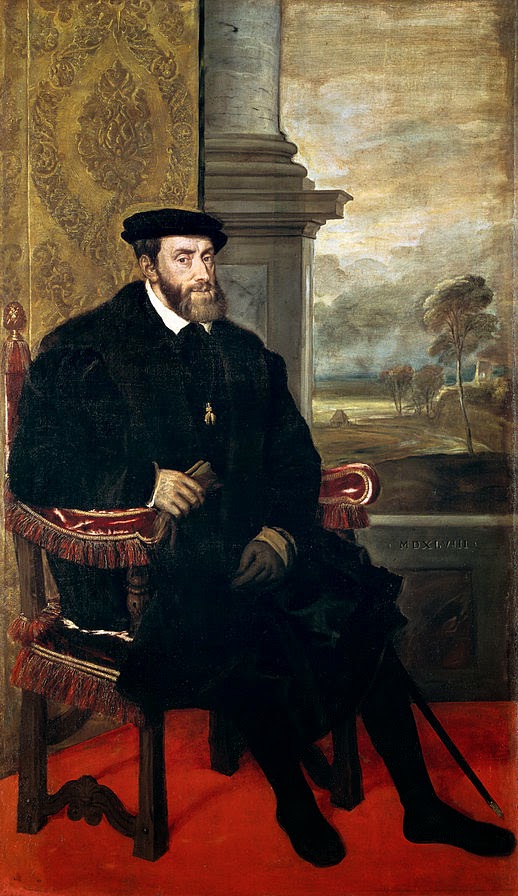Previously on The Peace of Augsburg and the Abdication of Charles V. And now William Robertson.
Time: 1555
Place: Augsburg, Germany
 |
| Charles V by Titian and his colleague Lambert Sustris. cc Wikipedia |
His voyage was prosperous, and he arrived at Laredo, in Biscay, on the eleventh day after he left Zealand. As soon as he landed he fell prostrate on the ground, and, considering himself now as dead to the world, he kissed the earth and said, "Naked came I out of my mother's womb, and naked I now return to thee, thou common mother of mankind." From Laredo he pursued his journey to Burgos, carried sometimes in a chair and sometimes in a horse-litter, suffering exquisite pain at every step, and advancing with the greatest difficulty. Some of the Spanish nobility repaired to Burgos, in order to pay court to him, but they were so few in number, and their attendance was so negligent, that Charles observed it, and felt, for the first time, that he was no longer a monarch. Accustomed from his early youth to the dutiful and officious respect with which those who possess sovereign power are attended, he had received it with the credulity common to princes, and was sensibly mortified when he now discovered that he had been indebted to his rank and power for much of that obsequious regard which he had fondly thought was paid to his personal qualities. But though he might have soon learned to view with unconcern the levity of his subjects, or to have despised their neglect, he was more deeply afflicted with the ingratitude of his son, who, forgetting already how much he owed to his father's bounty, obliged him to remain some weeks at Burgos before he paid him the first moiety of that small pension which was all that he had reserved of so many kingdoms. As, without this sum, Charles could not dismiss his domestics with such rewards as their services merited, or his generosity had destined for them, he could not help expressing both surprise and dissatisfaction. At last the money was paid, and Charles having dismissed a great number of his domestics, whose attendance he thought would be superfluous or cumbersome in his retirement, he proceeded to Valladolid. There he took a last and tender leave of his two sisters, whom he would not permit to accompany him to his solitude, though they requested him with tears, not only that they might have the consolation of contributing by their attendance and care to mitigate or to soothe his sufferings, but that they might reap instruction and benefit by joining with him in those pious exercises to which he had consecrated the remainder of his days.
From Valladolid he continued his journey to Plazentia in Estremadura. He had passed through this place a great many years before, and having been struck at that time with the delightful situation of the monastery of St. Justus, belonging to the order of St. Jerome, not many miles distant from the town, he had then observed to some of his attendants that this was a spot to which Diocletian might have retired with pleasure. The impression had remained so strong in his mind that he pitched upon it as the place of his own retreat. It was seated in a vale of no great extent, watered by a small brook, and surrounded by rising grounds, covered with lofty trees; from the nature of the soil, as well as the temperature of the climate, it was esteemed the most healthful and delicious situation in Spain. Some months before his resignation he had sent an architect thither to add a new apartment to the monastery, for his accommodation; but he gave strict orders that the style of the building should be such as suited his present station, rather than his former dignity. It consisted only of six rooms, four of them in the form of friars' cells, with naked walls; the other two, each twenty feet square, were hung with brown cloth, and furnished in the most simple manner. They were all on a level with the ground, with a door on one side into a garden, of which Charles himself had given the plan, and had filled it with various plants which he intended to cultivate with his own hands. On the other side, they communicated with the chapel of the monastery, in which he was to perform his devotions. Into this humble retreat, hardly sufficient for the comfortable accommodation of a private gentleman, did Charles enter, with twelve domestics only. He buried there, in solitude and silence, his grandeur, his ambition, together with all those vast projects which, during almost half a century, had alarmed and agitated Europe, filling every kingdom in it, by turns, with the terror of his arms, and the dread of being subdued by his power.
More information here.
No comments:
Post a Comment